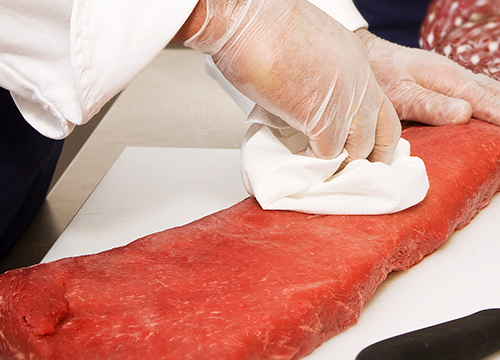While there can be vast differences between the regulations, expectations and auditing of food manufacturers and producers across the country, one thing remains constant – risk management is a key to success.
One way that companies can help to reduce their risk is to seek-out third-party food safety certifications. The requirements for certified food safety management systems are based on the principles of HACCP International. HACCP International operates an assessment and certification scheme for equipment, materials and services used within the food industry that make a contribution to food safety.
But there is even more to the story, with HACCP International working to make certification more transparent and to help food businesses identify appropriate use of products with Food Zone classifications. Karen Constable, Technical Manager of HACCP International explained, “Evaluation of products and services is strictly confined to characteristics which could have an impact on food safety or on the proper operation of a HACCP International based food safety programme.”
Certified products are classified as suitable for use in various applications or areas of a food facility. FZP (Food Zone Primary) items are suitable for use in the food zone and are suitable for contact with food. FZS (Food Zone Secondary) items are suitable for touching food contact surfaces but are not expected to touch food during normal conditions of use.
For example, wipers and cloths that are marketed with claims that they are suitable for direct contact with food must be verified as being suitable for such to be eligible for certification. If they are found to be suitable for certification they will be classified FZP. Wipers that are marketed for use as aids to cleaning and for use on food contact surfaces are certified with the food zone classification FZS if they are found to be suitable for such.

There are also SSZ (Splash or Spill Zone) items that are suitable for use in food zones, but are not suitable for coming directly into contact with food or items that will touch food. And NFZ (Non Food Zone) items make a contribution to food safety, but are not suitable for use in areas where open (unpackaged) food is handled.
Global leading brands like Tork Professional Hygiene recognise the importance of HACCP International certification and have a large number of wipers, hand towels, soaps and dispensers that have passed the strict certification criteria. When a business buys a Tork product with HACCP International certification they can be confident and assured that it has been assessed as safe for use in the food industry. There are very few brands of wipers and woven cloths that are classified FZP and HACCP International certified. However, a number of Tork wipers and cloths have been HACCP International certified FZP, including Tork Basic Papers, Wiping Papers and popular Tork Heavy Duty Cleaning Cloths, often used as a tea towel replacement in the hospitality industry.
“Verification of suitability for direct food contact can be done in a number of ways. Commonly, HACCP International will review and verify laboratory reports of testing for compliance to EU10/2011 and the requirements of EC1935/2004. The tests are used to check that the wiper (for example) does not let dangerous chemicals leach or migrate into food during contact,” said Constable.
So while many wipers and cloths may be used in kitchens wiping down meat and fish, straining oils and sauces, their job in food manufacturing is less likely to be in contact with food. But knowing that the risks have been assessed should that occur, is reassuring to the quality control manager who may be facing weekly audits and assessments. If it’s in the food zone, being food contact safe simply reduces the risk.